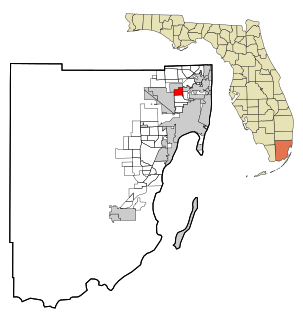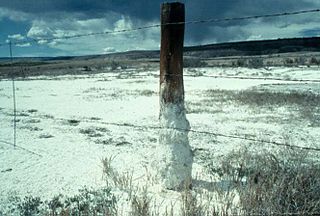John S. Gilmore is an American sociologist who has written extensively about western energy boomtowns in the 1970s and 1980s.

The United States of America (USA), commonly known as the United States or America, is a country composed of 50 states, a federal district, five major self-governing territories, and various possessions. At 3.8 million square miles, the United States is the world's third or fourth largest country by total area and is slightly smaller than the entire continent of Europe's 3.9 million square miles. With a population of over 327 million people, the U.S. is the third most populous country. The capital is Washington, D.C., and the largest city by population is New York City. Forty-eight states and the capital's federal district are contiguous in North America between Canada and Mexico. The State of Alaska is in the northwest corner of North America, bordered by Canada to the east and across the Bering Strait from Russia to the west. The State of Hawaii is an archipelago in the mid-Pacific Ocean. The U.S. territories are scattered about the Pacific Ocean and the Caribbean Sea, stretching across nine official time zones. The extremely diverse geography, climate, and wildlife of the United States make it one of the world's 17 megadiverse countries.

A boomtown is a community that undergoes sudden and rapid population and economic growth, or that is started from scratch. The growth is normally attributed to the nearby discovery of a precious resource such as gold, silver, or oil, although the term can also be applied to communities growing very rapidly for different reasons, such as a proximity to a major metropolitan area, huge construction project, or attractive climate.
While employed by the University of Denver Research Institute Gilmore wrote a number of influential papers and books regarding boomtown growth management. The most influential of which is the 1975 book Boom Town Growth Management: A Case Study of Rock Springs – Green River, Wyoming (with Mary K. Duff) (Westview, Florida Press).

The University of Denver (DU) is a private research university in Denver, Colorado. Founded in 1864, it is the oldest independent private university in the Rocky Mountain Region of the United States. DU enrolls approximately 5,600 undergraduate students and 6,100 graduate students. The 125-acre (0.51 km2) main campus is a designated arboretum and is located primarily in the University Neighborhood, about five miles (8 km) south of downtown Denver.

Westview is a census-designated place (CDP) in Miami-Dade County, Florida, United States. The population was 9,650 at the 2010 census.
Also influential and heavily cited is an article that appeared in the journal Science on February 13, 1976 called "Boomtowns May Hinder Energy Resource Development". The article outlined a hypothetical western boomtown called ‘’Pistol Shot USA’’, which summarized for the first time the social, political, and economic problems various energy boomtowns had been experiencing during the 1970s.

Science, also widely referred to as Science Magazine, is the peer-reviewed academic journal of the American Association for the Advancement of Science (AAAS) and one of the world's top academic journals. It was first published in 1880, is currently circulated weekly and has a subscriber base of around 130,000. Because institutional subscriptions and online access serve a larger audience, its estimated readership is 570,400 people.

Living organisms including humans are social when they live collectively in interacting populations, whether they are aware of it, and whether the interaction is voluntary or involuntary.

Wyoming is a state in the mountain region of the western United States. The state is the 10th largest by area, the least populous, and the second most sparsely populated state in the country. Wyoming is bordered on the north by Montana, on the east by South Dakota and Nebraska, on the south by Colorado, on the southwest by Utah, and on the west by Idaho and Montana. The state population was estimated at 577,737 in 2018, which is less than 31 of the most populous U.S. cities including Denver in neighboring Colorado. Cheyenne is the state capital and the most populous city, with an estimated population of 63,624 in 2017.

Soil salinity is the salt content in the soil; the process of increasing the salt content is known as salinization. Salts occur naturally within soils and water. Salination can be caused by natural processes such as mineral weathering or by the gradual withdrawal of an ocean. It can also come about through artificial processes such as irrigation and road salt.

Billings is the largest city in the U.S. state of Montana, with a population estimated at 109,642 as of 2017. Located in the south-central portion of the state, it is the seat of Yellowstone County and the principal city of the Billings Metropolitan Area, which has a total a population of 170,498. It has a trade area of over 500,000.

The Boomtown Rats are an Irish rock band that had a series of Irish and UK hits between 1977 and 1985. The group is led by vocalist Bob Geldof. The other members of the original line-up were Garry Roberts, Johnnie Fingers (keyboards), Pete Briquette (bass), Gerry Cott and Simon Crowe (drums). The Boomtown Rats broke up in 1986, but reformed in 2013, without Johnnie Fingers or Gerry Cott.

David Duane Freudenthal is an American attorney, economist, and politician who served as the 31st Governor of Wyoming from 2003 to 2011.
Productivity describes various measures of the efficiency of production. A productivity measure is expressed as the ratio of output to inputs used in a production process, i.e. output per unit of input. Productivity is a crucial factor in production performance of firms and nations. Increasing national productivity can raise living standards because more real income improves people's ability to purchase goods and services, enjoy leisure, improve housing and education and contribute to social and environmental programs. Productivity growth can also help businesses to be more profitable. There are many different definitions of productivity and the choice among them depends on the purpose of the productivity measurement and/or data availability.
The Western Slope of Colorado refers to a region of the U.S. state of Colorado incorporating everything in the state west of the Continental Divide, including Moffat, Routt, Hinsdale, Grand, Summit, LaPlata, Montezuma, Dolores, Eagle, Pitkin, Rio Blanco, Garfield, Mesa, Delta, Montrose, Gunnison, Ouray, and San Miguel counties and portions of Saguache, Archuleta, Mineral, and San Juan counties. The Colorado River and its tributaries divide the region into north and south at Grand Junction, Colorado. The area has a climate similar to that of the Great Basin.
In energy economics and ecological energetics, energy returned on energy invested, or energy return on investment (EROI), is the ratio of the amount of usable energy delivered from a particular energy resource to the amount of exergy used to obtain that energy resource.

Stanley Knapp Hathaway served as 27th Governor of Wyoming from January 2, 1967 to January 6, 1975, and as United States Secretary of the Interior under President Gerald Ford from June to October, 1975.
Wilton Marion Krogman was an American anthropologist. He was a leader in the development of the field of physical anthropology, with an early and lasting interest in dental anthropology.

Edgar Jacob Herschler, popularly known as "Gov. Ed", was the 28th Governor of Wyoming from January 6, 1975 to January 5, 1987. Herschler built a personal appeal to voters based on charisma, a small-town background, and shrewd political maneuvering to such an extent that he was the only three-term governor in Wyoming history.
The Efficiency Movement was a major movement in the United States, Britain and other industrial nations in the early 20th century that sought to identify and eliminate waste in all areas of the economy and society, and to develop and implement best practices. The concept covered mechanical, economic, social, and personal improvement. The quest for efficiency promised effective, dynamic management rewarded by growth.
Grover C. Gilmore is an American psychologist and currently Dean of the Mandel School of Applied Social Sciences at Case Western Reserve University. He is known for work funded by the National Institute of Health studying changes in visual perception that are associated with healthy aging and with Alzheimer's disease. His hypothesis is that a portion of the cognitive problems associated with aging and the memory problems in Alzheimer's disease may be attributed to sensory decline and not to higher order cognitive functions.

Stanley Deser is an American physicist known for his contributions to general relativity. Currently, he is emeritus Ancell Professor of Physics at Brandeis University in Waltham, Massachusetts and a Senior Research Associate at California Institute of Technology.
Profit, in accounting, is an income distributed to the owner in a profitable market production process (business). Profit is a measure of profitability which is the owner’s major interest in income formation process of market production. There are several profit measures in common use.

Gillette is a city in and the county seat of Campbell County, Wyoming, United States. The population was estimated at 30,560 as of July 1, 2017. Gillette is centrally located in an area involved with the development of vast quantities of American coal, oil, and coalbed methane gas. The city calls itself the "Energy Capital of the Nation," noting that the state of Wyoming provides nearly 35% of the nation's coal. Over the last decade Gillette saw a population increase of 48% from the 2000 census of 19,646 residents.

Norman Irving Wengert was an American political scientist who wrote about the politics of natural resources, advanced a seminal theory of the "politics of getting", and had a number of significant roles in his public and academic career. He was born in Milwaukee, Wisconsin to Eugene F. and Lydia Semmann Wengert. He pioneered the revival of the study of political economy in the United States with publication of Natural Resources and the Political Struggle, and later authored more than fifty monographs and studies on the political economy and public administration of environmental resources. His scholarship explored the politics of natural resources and environmental policy formation and administration, with emphases in national energy policy, urban water planning and management, land use planning and controls, national forest management, and citizen participation in administrative processes.
The Wyoming Outdoor Council is Wyoming's oldest, independent, membership-based conservation organization. Wyoming native Tom Bell founded the group in 1967, along with Carrol R. Noble, Margaret E. “Mardy” Murie, Dr. Harold McCracken, Ann Lindahl and others. The group was originally called the Wyoming Outdoor Coordinating Council.















